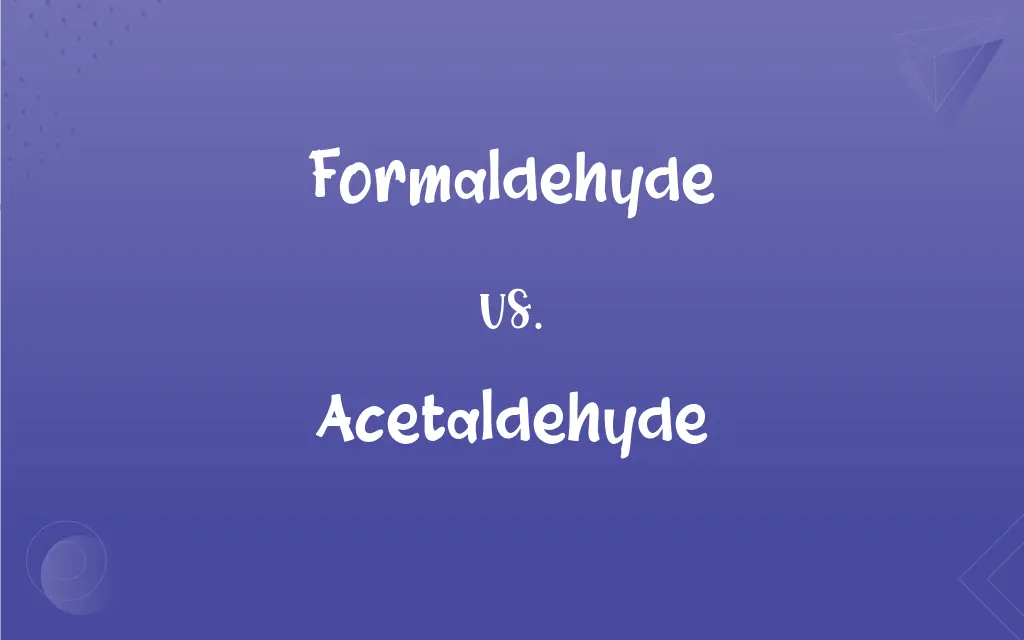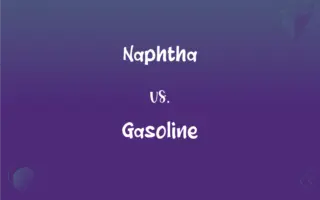Formaldehyde vs. Acetaldehyde: What's the Difference?
Edited by Aimie Carlson || By Harlon Moss || Published on January 5, 2024
Formaldehyde is a simple aldehyde with the formula CH2O; Acetaldehyde is a slightly larger aldehyde with the formula CH3CHO.

Key Differences
Formaldehyde and acetaldehyde are both aldehydes, but they differ in structure and properties. Formaldehyde has one carbon atom, making it the simplest aldehyde, while acetaldehyde contains two carbon atoms.
Formaldehyde is a colorless gas with a pungent smell, used in various industrial applications and as a preservative. In contrast, acetaldehyde is a volatile, flammable liquid with a fruity odor, used as a precursor in the synthesis of various compounds.
Formaldehyde is known for its use in embalming fluids and as a sterilizer, owing to its strong antibacterial and antifungal properties. Acetaldehyde is significant in the food and beverage industry, especially in the production of vinegar and as a flavoring agent.
In biochemistry, formaldehyde plays a role in the formylation of amino acids and other metabolic processes. Acetaldehyde is an intermediate in the metabolism of alcohol in the human body, contributing to the hangover effect.
Environmental and health impacts of formaldehyde include its classification as a carcinogen, with exposure linked to respiratory problems and skin irritation. Acetaldehyde also poses health risks, including potential carcinogenic effects and respiratory irritation.
ADVERTISEMENT
Comparison Chart
Formula
CH2O
CH3CHO
Size
Smaller, 1 carbon atom
Larger, 2 carbon atoms
State
Gas
Liquid
Smell
Pungent
Fruity
Uses
Preservative, sterilizer
Food additive, vinegar production
ADVERTISEMENT
Biochemical Role
Formylation of amino acids
Intermediate in alcohol metabolism
Health Impact
Carcinogenic, respiratory problems
Potential carcinogen, respiratory irritation
Formaldehyde and Acetaldehyde Definitions
Formaldehyde
A colorless gas used as a disinfectant.
Formaldehyde is often used to sterilize medical equipment.
Acetaldehyde
A flavoring agent in food.
Certain flavors are enhanced by acetaldehyde.
Formaldehyde
A preservative in embalming fluids.
Embalmers use formaldehyde to preserve bodies.
Acetaldehyde
A flammable liquid used in chemical synthesis.
Acetaldehyde is critical in the production of acetic acid.
Formaldehyde
A substance used in making plastics and resins.
Many plastics contain formaldehyde as a component.
Acetaldehyde
A precursor in the production of vinegar.
Vinegar's acidic nature comes from acetaldehyde.
Formaldehyde
An ingredient in some household products.
Formaldehyde can be found in certain cleaning agents.
Acetaldehyde
A compound with the formula CH3CHO.
Acetaldehyde's structure is a key in organic chemistry.
Formaldehyde
A chemical compound with the formula CH2O.
Formaldehyde's simple structure makes it a key organic building block.
Acetaldehyde
A byproduct of alcohol metabolism.
Acetaldehyde contributes to hangover symptoms.
Formaldehyde
A pungent colorless flammable gaseous compound, CH2O, the simplest and most reactive aldehyde, used for manufacturing melamine and phenolic resins, fertilizers, dyes, and embalming fluids and in aqueous solution as a preservative and disinfectant.
Acetaldehyde
A colorless, flammable liquid, C2H4O, used to manufacture acetic acid, perfumes, and drugs.
Formaldehyde
(organic compound) The simplest aldehyde, HCHO, a colourless gas that has many industrial applications; it dissolves in water to give formol (10%) and formalin.
Acetaldehyde
(organic compound) An organic compound, (CH3CHO). Sometimes called ethanal or acetic aldehyde. See aldehyde.
Formaldehyde
A colorless, volatile liquid, H2CO, resembling acetic or ethyl aldehyde, and chemically intermediate between methyl alcohol and formic acid.
Acetaldehyde
Acetic aldehyde. See Aldehyde.
Formaldehyde
A colorless poisonous gas; made by the oxidation of methanol
Acetaldehyde
A colorless volatile water-soluble liquid aldehyde used chiefly in manufacture of acetic acid and perfumes and drugs
FAQs
What is formaldehyde?
A colorless, pungent-smelling gas used in various industrial applications.
Is formaldehyde found in homes?
Yes, in some building materials and household products.
Are formaldehyde and acetaldehyde harmful?
Both can be toxic; formaldehyde is a known carcinogen, and acetaldehyde has potential carcinogenic effects.
Can formaldehyde cause health problems?
Yes, exposure can lead to respiratory issues and skin irritation.
How is acetaldehyde exposure minimized?
By controlling alcohol consumption and reducing exposure to smoke.
What are the uses of acetaldehyde?
Used in chemical synthesis, as a flavoring agent, and in vinegar production.
Is acetaldehyde present in alcoholic beverages?
Yes, it forms during alcohol fermentation.
What is acetaldehyde?
A flammable liquid with a fruity smell, used in the synthesis of other chemicals.
What are the uses of formaldehyde?
Used in resins, as a disinfectant, and in embalming fluids.
How are formaldehyde and acetaldehyde produced?
Formaldehyde is produced by oxidizing methanol; acetaldehyde is produced by oxidizing ethanol.
Can acetaldehyde cause health problems?
Yes, it can cause respiratory irritation and may contribute to hangover effects.
Is formaldehyde used in vaccines?
Sometimes, in tiny amounts, as a preservative.
Are there regulations for formaldehyde in products?
Yes, many countries have strict regulations on its use and emission levels.
Is formaldehyde in cigarette smoke?
Yes, it's one of the harmful chemicals present.
Is acetaldehyde naturally occurring?
Yes, it occurs in fruits and is a byproduct of alcohol metabolism.
Can acetaldehyde be used in plastics?
Not typically, it's more common in food and chemical industries.
How is formaldehyde exposure minimized?
Through ventilation and using low-emission products.
Are there regulations for acetaldehyde in products?
There are guidelines, especially in food and beverage industries.
Can formaldehyde be found in cosmetics?
Yes, in some hair smoothing products and nail hardeners.
Is acetaldehyde addictive?
It's not considered addictive, but it's a byproduct of addictive substances like alcohol.
About Author
Written by
Harlon MossHarlon is a seasoned quality moderator and accomplished content writer for Difference Wiki. An alumnus of the prestigious University of California, he earned his degree in Computer Science. Leveraging his academic background, Harlon brings a meticulous and informed perspective to his work, ensuring content accuracy and excellence.
Edited by
Aimie CarlsonAimie Carlson, holding a master's degree in English literature, is a fervent English language enthusiast. She lends her writing talents to Difference Wiki, a prominent website that specializes in comparisons, offering readers insightful analyses that both captivate and inform.































































